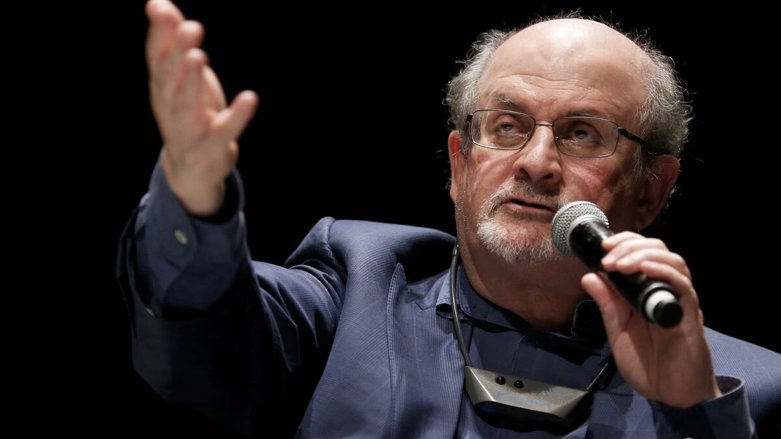Shi’a Extremist behind assault on Salman Rushdie
A quote, said to be from Khamenei, was repeatedly shared on social media: the fatwa against Rushdie was “fired like a bullet that won’t rest until it hits its target.”

WASHINGTON DC, United States (Kurdistan 24) –A stabbing attack on Friday on the novelist, the 75 year-old Salman Rushdie, as he was about to speak before a group in rural New York state, has left him badly injured.
Rushdie is on a ventilator following surgery, and his condition is unclear. “The news is not good,” his literary agent said in an email, explaining that he “will likely lose one eye; the nerves in his arm were severed; and his liver was stabbed and damaged.”
The assailant was seized immediately and later identified as a 24 year-old from New Jersey: Hadi Matar. Matar has been identified as a “Shi’a extremist,” whose social media posts reflect strong sympathies with Iran’s clerical regime.
An Indian-born Muslim, Rushdie lived in Britain in 1988, when he published his fourth novel, “The Satanic Verses,” which some Muslims condemned as blasphemous. In February 1989, on the tenth anniversary of Iran’s Islamic revolution, the country’s Supreme Leader, Ayatollah Ruhollah Khomeini, issued a religious decree, calling for Rushdie’s murder. Several months later, Khamenei died.
In 1998, the Iranian government, under the relatively moderate President Hassan Rouhani, said it would not support that ruling. However, religious hardliners, including Khomeini’s successor and the current supreme leader, Ayatollah Ali Khamenei, maintained that the fatwa was “irrevocable” and could not be rescinded.
Although Iran has not commented officially, many of the regime’s supporters have applauded the attack on social media. A quote, said to be from Khamenei, was repeatedly shared on social media: the fatwa against Rushdie was “fired like a bullet that won’t rest until it hits its target.”
Literary World Shocked
The assault on Rushdie occurred at the Chautauqua Institution, which hosts prestigious conferences in a relaxed, comfortable, and rural summertime atmosphere (as this reporter can attest from personal experience.)
“The attack stunned onlookers, who had gathered in the 4,000 seat amphitheater” at the institution, “a summertime destination for literary and arts programming,” The New York Times reported.
Ironically, Rushdie, was to speak on “the United States as asylum for writers and other artists in exile and as a home for freedom of creative expression,” Chautauqua explains on its website.
“The attack was decried by literary figures and public officials,” the Times stated, as it cited the head of Penguin Random House, which publishes Rushdie’s books, “We are deeply shocked and appalled to hear of the attack.”
The chief executive officer of PEN America, which advocates for freedom of speech, issued a statement, “We can think of no comparable incident of a public attack on a literary writer on American soil.”
Plots and Warnings Preceding Attack Ignored
Yet there was plenty of warning. Just two days before, on Wednesday, the U.S. Justice Department announced criminal charges against an Iranian intelligence agent who plotted to murder former National Security Advisor Amb. John Bolton. The documents which the Department released in that context revealed a second Iranian plot—against former Secretary of State Mike Pompeo.
Read More: Iran plotted to assassinate Bolton, Pompeo
In addition, federal authorities in New York last year charged that Iranian intelligence had plotted to kidnap an Iranian-American journalist, who works for the Persian service of the Voice of America and who is highly critical of the regime. Just two weeks ago, a man with an assault rifle was arrested outside her home in Brooklyn.
But none of that translated into a sense of a broader Iranian threat in the U.S.—not to law enforcement in western New York, nor to the literary world, nor to Rushdie himself.
Perhaps, the problem was the U.S. success in detecting the Iranian plots, producing a complacency that any such threat would be discovered in advance, and then thwarted.
Perhaps, politics contributed as well. The literary world tends toward the left and generally supports the Democratic party. Since the Obama administration, Democrats have sought an accommodation with Iran.
Playing Down the Iranian Threat
Indeed, the Biden administration has generally played down the extent of Iran’s malign behavior, in an effort, coordinated with the European Union to restore the 2015 Iranian nuclear deal, which Donald Trump left in 2018.
On Thursday, Israel’s Defense Minister, Benny Gantz, denounced Iran in very strong terms for its support for Palestinian Islamic Jihad (PIJ), with which Israel fought a three-day battle a week ago.
PIJ gets substantial support from Iran, and Gantz denounced the terrorist group, which fired nearly 1,200 rockets and missiles at Israel in that brief conflict, as “a violent Iranian proxy.”
Later on Thursday, Kurdistan 24 asked the State Department’s Principal Deputy Spokesperson Vedant Patel, if the U.S. agreed with Gantz’s description of the relationship between Iran and PIJ.
Read More: US continues to blame Iran for stalemate on nuclear deal—but still willing to conclude agreement
Patel’s response was tepid. “The United States is under no illusions about Iran’s destabilizing activities throughout the region,” he said. “If Iran wants to show it can be a responsible actor, now is the time for it to play a constructive role in the region.”
“That position seems unlikely to have much impact in Iran,” is how Kurdistan 24 summarized the situation.